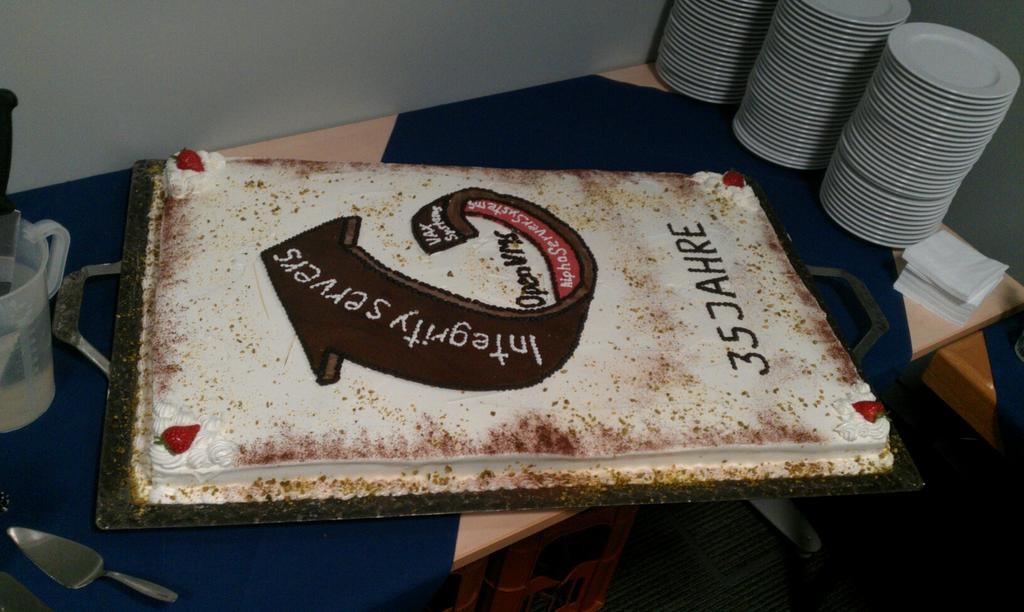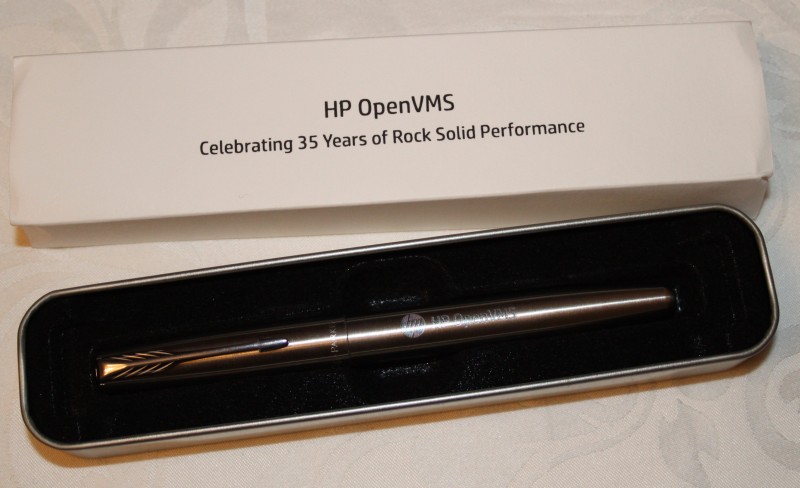HP OpenVMS Technical Update Days 2012
This week the annual "OpenVMS Technical Update Days 2012" has been taking place at HP. Like every year the event's focus was the technical progress of OpenVMS.
I'm quite new to OpenVMS and recently discovered the operating system. For me it was the first time I've been to the OpenVMS TUDs.
The agenda was extensive and has packed two complete days:
| Day 1 | Day 2 |
| OpenVMS - keep on working together | Open Source & Unix Portability |
| Your future with OpenVMS | Your future with Integrity Servers |
| OpenVMS Update News | Itanium News |
| Connect | OpenVMS on large Blades - practical experiences |
| OpenVMS vs Linux/Windows - security costs | The Charon Emulator in real life |
| OpenVMS Services from HP | Oracle Database on OpenVMS and Oracle Rdb Product Updates |
| The Secrets of EFI | Storage Update |
| News from the OpenVMS hobbyists | OpenVMS Success Story |
| Open Discussion Panel | OpenVMS in a new environment |
Source: german OpenVMS portal and HP website
Contents
The agenda was really comprehensive and combined both sales and technical topics.
In the talk "OpenVMS vs Linux/Windows - security costs" a frequenly discussed fundamental topic was seized - administrative and personnel costs of OpenVMS were compared to Windows and Linux costs. The talk's quintessence was that OpenVMS administrators have to patch their systems infrequently due to OpenVMS's design and concept - so they're able to administrate more systems at the same time than Windows and Linux administrators. Of course the results were in general and can't be consigned to any companies. To define a exact statement which operating system is "cheaper" additional company-specific factors have to be attended. However, this talk was very interesting and forced a open discussion - it nearly got beyond the talk's time frame.
It is still dimmish to me how HP wants to design the future of HP-UX and OpenVMS using "Project Odyssey". Project Odyssey's mission is (in accordance with HP's statement) "expanding, not replacing" - so the customer is able to choose between Alpha, Itanium and Xeon. Because porting to x86 was disclaimed by HP I'm wondering how this will be done. "Project Moonshot" was also mentioned - using this HP wants to get into the ARM-based server market. It's consideration is to produce (blade ) servers with a huge amount of low-powered ARM-based processors to serve a "green" alternative.
I really enjoyed observing the talk "Itanium News" by Intel. In this talk, the new Itanium family "Poulson" (Itanium 95xx) was presented. After 5 years of development the Itanium processor was ported from 65nm to 32nm manufacturing technology - as a result, the new processors are more energy-efficient. Beyond that, the new processors will be equipped with a shared cache of 54 MB (the earlier processors had dedicated caches per core). Additionally each core comes with its own L1 and L2 cache. In accordance with the multi-domain technology Hyper-Threading is available to every core so that each core is able to compute two tasks quasi-simultaneous. A new technology named "Instruction Replay" serves more integrity and offers an intelligent error detection - using this technology erroneous instructions can be recognized and re-executed again. The new Itanium family consists of 4 processors:
| CPU | Cores/Threads | Clockrate | TDP |
| Itanium 9520 | 4/8 | 1.73 Ghz | 130 watts |
| Itanium 9540 | 8/16 | 2.13 Ghz | 170 watts |
| Itanium 9550 | 4/8 | 2.4 Ghz | 170 watts |
| Itanium 9560 | 8/16 | 2.53 Ghz | 170 watts |
The next processor family named "Kitson" is already in progress and will be released roughly at the same time as the Haswell architecture (2014/2015). The next generation of Itanium processors will be manufactured in 22nm size and have a more modular design. It is planned to keep the Itanium and Xeon instruction sets as similar as possible to reduce production complexity amongst others. Beyond that the Kitson-Itaniums will have even more cores.
Oracle also had a talk on the TUDs - they informed about new product updates for OpenVMS and HP-UX. In september HP finally defended their support plans against Oracle's idea to drop the support to Itanium-based products. Oracle will continue supporting Oracle Database and Oracle Rdb for Itanium including OpenVMS.
In the talk "News From the Hobbyists" an experimental version of an SIMH emulator with multiproccessing functionality was presented. Using a few tricks it is possible to run OpenVMS with multiple processors on a virtual VAX. A similar emulator was part of the last talk "OpenVMS in a new environment" where it was used on a notebook and a Raspberry Pi to run a virtual OpenVMS 7.3 server. The energy-saving embedded board created a strong interest because many participants didn't know the Raspberry Pi and the possibility to run OpenVMS on it. The virtual VAX didn't ranked behind a conventional VAX like some benchmark results has been proved.
I also learned a thing or two about EFI in the talk "The Secrets of EFI" which focussed the HP EFI-extensions. For example I got in touch with the -NC switch which can be used in combination with the command PC to turn a systen on or off without any confirmation:
[hostname] MP> cm [hostname] MP:CM> pc -off -nc
This switch isn't mentioned in the help included in the EFI shell.
Several migrations experiences were presented in the talk "The Charon Emulator in Real Life". I find it interesting how different the experiences while migrating Alpha and VAX systems were and how the final solutions looked like. For example, a customer with 5 alpha systems migrated to a single cheap x86 server and still has a better performance than before. This is yet another example for the great engineering progress of the x86-architecture.
35th anniversary

OpenVMS had its 35th anniversary on the 25th october - of course this was also a part of the TUDs. Customers experiences were presented and - while eating a slice of an OpenVMS cake - practical stories were told. As a thank-you gift everybody who filled out a feedback form got an OpenVMS pen. I have to say - this classy thing looks good on my table. 🙂
The OpenVMS scene

When I entered the hall I immediately recognized that I was the youngest participant - many comments confirmed my assumption ("Hey, you're destroying our average age!"). 🙂
Even if some years were between me and the most other participants, it didn't harm the way of communication. It is notable how friendly and open new people are welcomed by the rather private circle. New faces are always welcome and were integrated in open discussions. For me, it was more than interesting to hear how long the individual participants were using OpenVMS and which experiences they had made.
You can see that the german user forum is relatively small because it seems like that everybody knows each other personally. I met two OpenVMS enthusiasts on Twitter and got in a conversation with them on the event. It only took a few minutes until a plenty of additional persons stood around and were greeted personally. Even HP employees from all around the world and some OpenVMS engineers found the way to Bad-Homburg.
Conclusion
HP perseveres to keep the OpenVMS user forum and offers a great event for experience exchanges and contact establishing every year. The event is without any charge for customers and interested persons - palatable food is guaranteed too (which is typically for HP).
I really enjoyed the friendly-open atmosphere and the interesting talks. I'm looking forward to participate again next year - it's highly recommended for everyone who is interested in OpenVMS to participate, too. 🙂